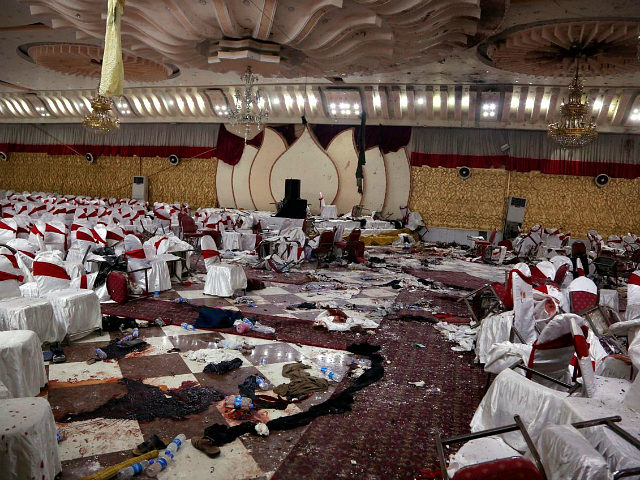Afghanistan’s president this week vowed to take “revenge” and “eliminate” Islamic State (ISIS/ISIL) safe havens in the country after the group killed 63 civilians at a wedding, including children.
ISIS claimed responsibility for the horrific attack at a wedding hall in Kabul late Saturday night that left at least 63 people dead and nearly 200 others injured. The event was believed to be a Shiite Hazara gathering. The Sunni Taliban have long targeted Shiite Hazaras. In recent years, Sunni ISIS, a Taliban rival, has also gone after the Shiite group.
Referring to the recent wedding massacre in a statement marking 100 years of Afghanistan’s independence from the British on Monday, Ghani declared that his country “will take revenge for every civilian drop of blood,” the Associated Press (AP) reported.
“Our struggle will continue against [ISIS], we will take revenge,” he stressed, adding that his country will “eliminate” the jihadi group.
U.S. Secretary of State Mike Pompeo described the bombing as “an attack against humanity.”
Despite more than $80 billion in American taxpayer funds devoted to developing the Afghan security forces over nearly 18 years, the troops continue to struggle to defeat the Taliban and now ISIS.
Radio Free Europe/Radio Liberty (RFE/RL) noted Monday that on Afghanistan’s Independence Day:
At least 52 people were injured in 10 blasts in the eastern city of Jalalabad on August 19 as people were heading out to celebrate, the office of Nangarhar Province’s governor said. Some reports put the casualty toll at 66.
Officials said that most of the people sustained minor injuries and were released after treatment at local hospitals.
Jalalabad is the capital of Nangarhar, considered to be home to ISIS’s primary stronghold in Afghanistan. However, both the Taliban and its rival ISIS operate in the region.
According to the Pentagon, Afghanistan is home to the “highest regional concentration” of terrorist groups in the world, including the Taliban, al-Qaeda, the Haqqani Network, and ISIS.
U.S.-backed local forces destroyed ISIS’s territorial caliphate in Iraq and Syria in March. Nevertheless, thousands of jihadis remain there and beyond, particularly in Afghanistan.
While Russian officials say the number of ISIS jihadis in Afghanistan has reached around 5,000, the U.S. military places the estimated strength of the group at about 2,000.
In June, American and Afghani government officials cautioned that ISIS is expanding its footprint in Afghanistan. They also warned that the terrorist group is planning to use the country as a base for attacks against the United States and other Western countries.
Days before Saturday’s attack, Sediq Sediqqi, a spokesman for Ghani, expressed similar concerns about ISIS’s growing strength and their ongoing attraction for some Taliban jihadis, as Reuters reported last Thursday.
“Most [ISIS] are ex-Taliban, and there could be a possibility of some Taliban joining. The Afghan government and the U.S. have shared goals combating terrorism,” Sediqqi declared, echoing the U.S. military. “We need the support of our international partners.”
The majority of ISIS fighters are former Pakistani Taliban and to a much lesser extent from the Afghan version of the group. Both organizations consider themselves to be two distinct groups, with different goals, and leaders.
Some Pakistani Taliban members did swear allegiance to ISIS.
Meanwhile, ISIS has been fighting with the Afghan Taliban for territory and influence.
The Taliban remains the most potent terrorist group in Afghanistan, controlling or contesting about half of the country. ISIS, on the other hand, remains primarily concentrated in and around Nangarhar province, along the Pakistan border. The group has also expanded to northern Afghanistan.
The U.S. and the Taliban are expected to finalize a peace pact soon. Under the potential accord, negotiators have agreed to pull out foreign forces in exchange for Taliban promises to prevent Afghanistan from harboring international jihadis like al-Qaeda and ISIS.
When it comes to the September 11 attack allies, the United Nations recently reported that the Taliban and al-Qaeda remain close.
Meanwhile, ISIS is reportedly capitalizing on the ongoing peace negotiations between their rivals — the United States and the Taliban — by seeking to bring disenfranchised into their ranks.
“A number of Taliban jihadists are reportedly unhappy with their leadership’s ongoing peace negotiations with the US in Doha, Qatar,” Deutsche Welle (DW) reported Monday.
“A deal between the Taliban and the United States for U.S. forces to withdraw from their longest-ever war in Afghanistan could drive some diehard Taliban fighters into the arms of the Islamic State militant group, Afghan officials and militants say,” according to Reuters.
The Taliban, however, denied reports about the peace pact pushing its fighter into the arms of ISIS.
ISIS officially announced its presence in Afghanistan in early 2015. The ISIS wing is named the Khorasan Province after a historical name for a region that covers Afghanistan, Pakistan, parts of Iran, India, and other surrounding countries.

COMMENTS
Please let us know if you're having issues with commenting.